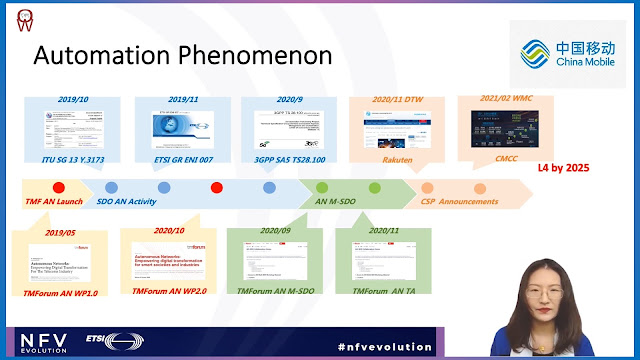At the ETSI NFV Event back in April, Dr. Lingli Deng, China Mobile presented a talk on "From Orchestration Towards Automation". The abstract of the talk says:
Autonomous network proposes to optimize user experience, automate management operations, and maximize resource efficiency by simplifying network architecture, encapsulating autonomous domains, and providing closed loops for business/network operation control, and clarifies the target architecture and implementation path for network intelligence.
The autonomous network puts forward two dimensions of space and time requirements for the network management system of telecom operators:
On the one hand, the hierarchical, domain, and closed-loop autonomous architecture and cross-layer business-driven interaction of autonomous driving networks require operator network management systems to achieve functional enhancements ("addition") and interface simplification ("subtraction") in the spatial dimension.
On the other hand, the introduction of AI technology in autonomous driving networks and the complexity of network management itself require operators to achieve continuous iteration and gradual improvement in the time dimension of their network management system ("spiral upward").
In this speech, we will share China Mobile's autonomous network goals, approach, related practice, and overall thinking about the obstacles we are facing and proposed way forward, especially from the perspective of industrial collaboration, and the progress and next steps of ETSI NFV related work.
In particular, as an essential part of network management plane, MANO will need to be enhanced not only with simplified intent/policy interfaces, but also providing basis for enabling a complete zero-touch close loop (including VNF configuration), as well as the DevOps mechanism for AI models and/or analytics microservices embedded with network elements
The talk is embedded below:
In the ITU News MAGAZINE last year, researchers from China Mobile Research Institute contributed an article on "A standards round-up on autonomous networks". The article provides a detailed list of specifications in various groups including ITU, 3GPP, ETSI, etc.
Quoting from the magazine:
There are discussions among standards development organizations (SDOs) about the level of autonomous capabilities in networks
The study of autonomous network levels (ANL) can provide reference and guidance to operators, vendors and other participants of the telecommunication industry for autonomous networks, standardization works and roadmap planning.
Since industrial convergence is the key for reducing the cost for any single vendor or single network operator, building an open collaboration platform for cohesively developing both a reference implementation for case-agnostic functional architecture and standardized external or internal interfaces would be the easy way for communication service providers (CSPs) to kick off and stay in the converged direction towards network autonomy.
For example, a rule-based policy engine could be one of the common functional modules to support both timed control tasks in Level 1, imperative closed loops in Level 2, and adding intent-to-rule translation modules in Levels 3 and 4.
The article starts on page number 23. You can download from here.
Related Posts:
- Operator Watch Blog: World's Largest Mobile Networks by Data Traffic - March 2021
- Operator Watch Blog: Top 20 Telcos Worldwide in Q3 2020, Based on Capex by MTN Consulting
- Operator Watch Blog: China Mobile on The Next Phase of 5G: Progress, Challenges, and Opportunities
- Free 6G Training: China Mobile on the 5G/6G Connectivity Transformation for Sustainability
- Operator Watch Blog: China Mobile Establishing "5G+" Competitive Advantages
- The 3G4G Blog: ITU Standardization Bureau on Machine Learning for 5G
- The 3G4G Blog: Artificial Intelligence (AI) / Machine Learning (ML) in 5G Challenge by ITU



No comments:
Post a Comment